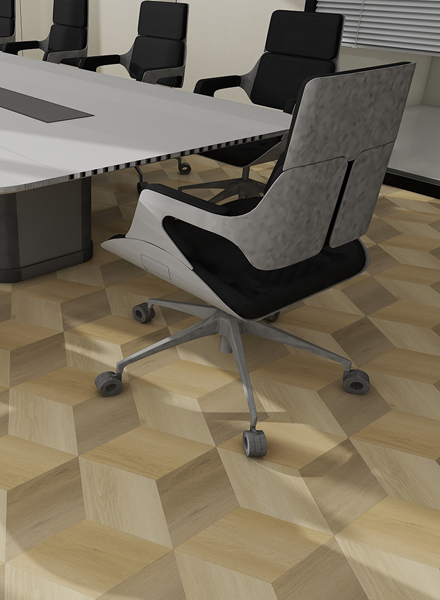Resilient flooring is a versatile and durable flooring solution that is increasingly popular in both residential and commercial settings. With its ability to withstand wear and tear, ease of maintenance, and wide range of aesthetic options, resilient flooring offers a variety of benefits for various types of environments.
1. Vinyl Flooring: The Most Popular Choice for Resilient Flooring
Vinyl flooring is one of the most common types of resilient flooring available. It consists of synthetic materials that are designed to be flexible and durable. This type of flooring comes in two main forms: sheet vinyl and vinyl tiles (VCT or LVT).
Features:
Water-resistant: Vinyl flooring is resistant to moisture, making it ideal for wet areas like bathrooms, kitchens, and laundry rooms.
Easy installation: Many vinyl flooring options come with peel-and-stick or click-lock features, allowing for quick and easy installation.
Variety of styles: Vinyl flooring is available in a wide range of colors, patterns, and textures, including designs that mimic hardwood or stone.
Benefits:
Durability: Vinyl flooring is highly durable and can withstand heavy foot traffic, making it a great choice for both residential and commercial spaces.
Cost-effective: Compared to other types of resilient flooring, vinyl is often more affordable, offering excellent value for money.
Applications:
Residential spaces, including kitchens, bathrooms, and living rooms
Commercial spaces such as offices, retail stores, and healthcare facilities
2. Linoleum Flooring: A Sustainable Resilient Option
Linoleum flooring is made from natural materials, including linseed oil, cork dust, wood flour, and jute. It is an eco-friendly and sustainable option for resilient flooring that offers a warm and classic aesthetic.
Features:
Biodegradable: As a natural product, linoleum is biodegradable and more environmentally friendly compared to synthetic options.
Anti-bacterial properties: Linoleum naturally resists bacteria, making it an excellent choice for high-hygiene environments like hospitals or kitchens.
Wide range of colors: Linoleum flooring comes in a variety of vibrant colors and patterns.
Benefits:
Eco-friendly: Linoleum is a sustainable option for those looking to reduce their environmental footprint.
Long lifespan: When properly maintained, linoleum can last for decades without showing signs of wear.
Applications:
Schools, hospitals, and other public institutions
Residential spaces with a preference for eco-friendly materials
3. Rubber Flooring: Ideal for High-Traffic Areas
Rubber flooring is known for its incredible durability and shock-absorbing properties. Made from either natural or synthetic rubber, this resilient flooring type is commonly used in areas that experience high levels of foot traffic or physical activity.
Features:
Slip-resistant: Rubber flooring is naturally slip-resistant, making it an excellent choice for areas where safety is a priority.
Cushioned feel: The rubber material provides a soft, cushioned feel underfoot, which is ideal for areas that require comfort or where people stand for long periods.
Benefits:
Impact resistance: Rubber flooring is highly resistant to impact and can absorb shock, making it ideal for gyms, playrooms, and other active environments.
Easy maintenance: It is easy to clean and resistant to stains, odors, and chemicals.
Applications:
Gyms, fitness centers, and recreational facilities
Healthcare settings, such as hospitals or nursing homes
Industrial environments
4. Cork Flooring: Eco-Friendly and Comfortable
Cork flooring is another resilient option that offers excellent comfort and sustainability. Made from the bark of cork oak trees, this flooring type is renewable and biodegradable.
Features:
Comfortable underfoot: Cork’s natural properties make it a softer, more comfortable option compared to harder surfaces like ceramic or stone.
Insulating properties: Cork flooring has excellent thermal and sound insulation properties, helping to keep spaces warmer and quieter.
Benefits:
Sustainable: Cork is a renewable resource that is harvested without harming the trees, making it an eco-friendly option for resilient flooring.
Allergy-friendly: Cork is naturally hypoallergenic and resists mold, mildew, and dust mites.
Applications:
Residential spaces, especially living rooms, bedrooms, and home offices
Commercial spaces that require quiet, comfortable environments
5. Concrete Flooring: A Modern Resilient Solution
While concrete flooring may not seem like a typical choice for resilient flooring, it can be treated to create a smooth, polished, and durable surface. Concrete flooring is highly resilient, versatile, and low-maintenance.
Features:
Long-lasting: Concrete flooring is incredibly durable and can last for decades with minimal upkeep.
Customizable: Concrete floors can be stained, polished, or stamped to create various finishes that suit different aesthetic preferences.
Benefits:
Cost-effective: Concrete flooring is generally affordable, especially in large commercial spaces.
Low maintenance: Concrete is easy to clean and does not require regular refinishing.
Applications:
Commercial spaces, such as warehouses, retail stores, and showrooms
Modern residential homes with an industrial aesthetic
6. Thermoplastic Flooring: Heat-Resistant and Flexible
Thermoplastic flooring is a type of resilient flooring made from a synthetic polymer that can be molded when heated. This flexible flooring solution is commonly used in areas that require a high degree of customization and durability.
Features:
Heat-resistant: Thermoplastic flooring can withstand high temperatures, making it ideal for areas with heavy machinery or equipment.
Seamless installation: This type of flooring can be installed seamlessly, eliminating the need for grout lines or joints.
Benefits:
Durability: Thermoplastic flooring is resistant to stains, scratches, and moisture, providing long-lasting performance.
Easy to repair: If damage occurs, thermoplastic flooring can often be repaired by simply heating and remolding the material.
Applications:
Hospitals, schools, and public institutions
Industrial settings and areas with heavy equipment
There are many types of resilient flooring, each with its own unique features and benefits. Whether you’re looking for a budget-friendly option like vinyl, a sustainable choice like cork, or a high-performance solution like rubber, resilient flooring provides a wide range of possibilities for both residential and commercial spaces. By considering factors such as durability, comfort, maintenance requirements, and aesthetics, you can select the best resilient flooring option that suits your needs and budget.
With its ability to stand up to high traffic, moisture, and impact, resilient flooring is a smart investment for any space. Whatever your requirements may be, there is sure to be a resilient flooring solution that fits your needs perfectly.


































